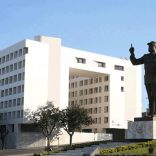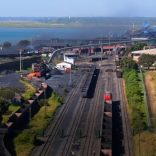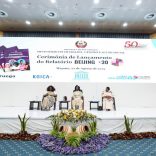Mozambique: Administrative Tribunal audit criticises Housing Development Fund
Mozambique: “Abundance of natural resources is not synonymous with growth” – Zandamela

File photo: Rogério Zandamela
Bank of Mozambique governor Rogério Zandamela says that abundant natural resources are not enough to make Mozambique a country with robust and inclusive growth if the use of the resulting revenues does not meet the expectations of society and the communities from which these resources are extracted.
Zandamela also said on Friday that the country’s internal debt, estimated at 100.5 billion meticais, was high, and related debt sustainability to the dynamics of the market.
The bank governor’s remarks came during a lecture he gave during the opening of the academic year at the Pedagogical University in Maputo, the country’s largest higher education institution.
The governor spoke on “the dilemma of having many natural resources and yet not achieving the desired levels of economic growth”, a scenario well reflected in the country’s current reality.
Zandamela said that the dilemma of abundance of natural resources coexisting with poverty could be characteristic of Mozambique if not properly addressed.
“I believe that the first great challenge is to integrate civil society, especially the youth, in the debate on how to create a national wealth fund that would allow the transformation of gains obtained by the exploitation of non-renewable natural resources to generate renewable resources,” he said.
Zandamela challenged university students to create an active and sound critical mass and demand greater participation in the process of defining the rules that would guide the use of revenues from the exploitation of natural resources and in the choice of a suitable development model for the country.
He stressed that the debate was urgent because Mozambique still had many basic needs to be addressed, as well as working to ensure the wealth for future generations.
“It is vital that you are empowered – and universities are a good place to do it – and take ownership of your future by starting now an arduous, active monitoring of policy-making processes so as to ensure that your interests are reflected in the policy measures to be implemented,” he told students.
Rogério Zandamela underscored the need for students to acknowledge that it is right to take such an attitude, as well as to demand greater rigour and discipline from current policymakers in the use of natural resource revenues, to ensure that gains are used for the construction of priority infrastructure and the generation of human capital.
“Only in this way can the productive structure of the economy be transformed, and gains and opportunities generated for future generations,” he said.
Mozambique has a privileged geographic location in southern Africa. In addition to being a preferential route for international trade with access to the countries of the hinterland, it has a 2,300-kilometre coastline offering enormous fishing and tourism potential.
The country also has 36 million hectares of arable land, as a result of which agriculture is the main source of income, accounting for about 25 percent of gross domestic product. The country also has good potential for hydroelectric, wind and geothermal energy production and is seen as a potential solution to the electricity deficit in the SADC region.
Mozambique has also been in the spotlight recently following the discovery of huge deposits of hydrocarbons, particularly coal and natural gas, but continues to register development well below what might be expected.












Leave a Reply
Be the First to Comment!
You must be logged in to post a comment.
You must be logged in to post a comment.